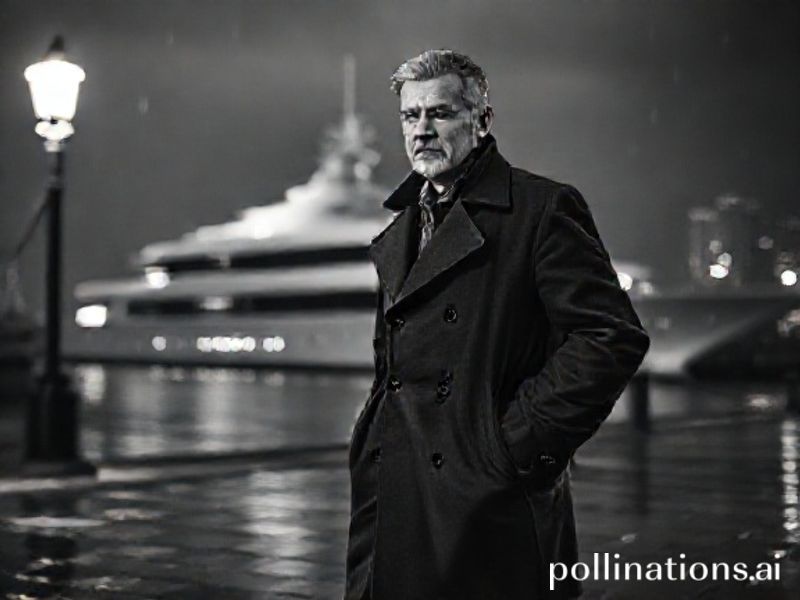From Chelsea to Stateless: How Roman Abramovich Became the World’s Most Famous Orphaned Yacht Owner
A Yacht Too Far: Roman Abramovich and the Art of Losing Everything Except the Bill
By Dave’s Foreign Desk, currently anchored in a moral grey zone somewhere west of Cyprus
There are billionaires who merely buy football clubs; then there is Roman Arkadyevich Abramovich, the man who turned oligarchy into a spectator sport. For two decades the Stamford Bridge faithful sang his name in grateful, if slightly nervous, chorus. Today the same man is stateless on paper, his 533-ft “Eclipse” reportedly renamed “Solaris” and then renamed again after every sanctions update, like a child playing musical chairs with maritime registries. Somewhere in the Caribbean, a bored harbor master is probably updating the paperwork for the third time this month, wondering if Microsoft Excel has a macro for geopolitical whiplash.
The global morality play now starring Abramovich is less Shakespearean tragedy than Netflix docu-drama: bingeable, cynically marketed, and cancelled the moment ratings dip. After Russia’s invasion of Ukraine, Western governments discovered, with the convenient shock of a detective who’s just found the corpse in the library, that Russian money might—brace yourselves—be entangled with the Kremlin. Overnight, Abramovich went from charming enigma to “person with whom we are urgently no longer friends,” proving that geopolitical alliances have the half-life of a TikTok trend.
The implications ricochet far beyond the Thames. Switzerland froze his trusts; Jersey channelled its inner Bond villain and impounded a $600 million super-yacht; the EU debated whether a football club counts as a “family heirloom.” Each confiscation was accompanied by press releases so pious they could be sung by cathedral choirs—though the same officials were remarkably quiet when Abramovich was buying penthouses and Champions League titles like impulse items at checkout. Hypocrisy, after all, is the one commodity whose supply never runs short.
Meanwhile, Israel offered him citizenship under the Law of Return, reminding us that passports are just loyalty cards with better boarding queues. Tel Aviv calculated—correctly—that a man who once delivered Putin’s tea can probably deliver venture capital, too. Across the Middle East, Gulf states sized up distressed assets as if at a going-out-of-business sale: Chelsea Football Club, cut-rate Picassos, and the world’s largest carbon-fiber toy boat. The message to every kleptocrat in the souk was clear: park your money here, we still believe in customer loyalty.
In Africa and Latin America, Abramovich’s plight reads like a cautionary tale about keeping all your billions in Western custodianship. Central bankers from Lagos to Lima are quietly updating contingency plans: maybe diversify into yuan, gold, or, for the truly adventurous, crypto stored on a thumb drive in a Lagos freezer. The Global South has learned that sanctions regimes are weather systems—capricious, devastating, and prone to climate change whenever CNN discovers a new villain.
Even oligarchs, it turns out, are subject to the same mundane miseries as the rest of us: paperwork, cancelled flights, the indignity of a yacht that can’t find a friendly port. The difference is scale. When you or I overstay a visa, we get a grumpy deportation officer. When Abramovich overstays welcome, entire governments rewrite maritime law. The rich, as F. Scott Fitzgerald almost said, are different—they have bigger problems.
And yet, the man persists. Reports swirl that he’s negotiating to funnel proceeds from the Chelsea sale into a Ukrainian relief fund, a PR move so transparent it could double as bulletproof glass. Whether born of genuine remorse or simply the awareness that history books are written by the victors is irrelevant; both motives spend the same in reputation laundromats. In the end, Abramovich may discover the most expensive lesson of all: redemption, like real estate, is location-dependent.
Conclusion
The Abramovich saga is not really about one man’s fall from grace; it’s about the global architecture that hoisted him up in the first place—the offshore latticework of shell companies, golden visas, and “strategic investor” programs that allow money to move faster than shame. When the music stops, someone is left holding the yacht. The rest of us are left with the uneasy knowledge that today’s hero sponsor of children’s hospitals is tomorrow’s sanctioned pariah, depending on which way the artillery is pointing. In the great casino of international finance, the house always wins. The only question is whose flag is flying above it this week.







